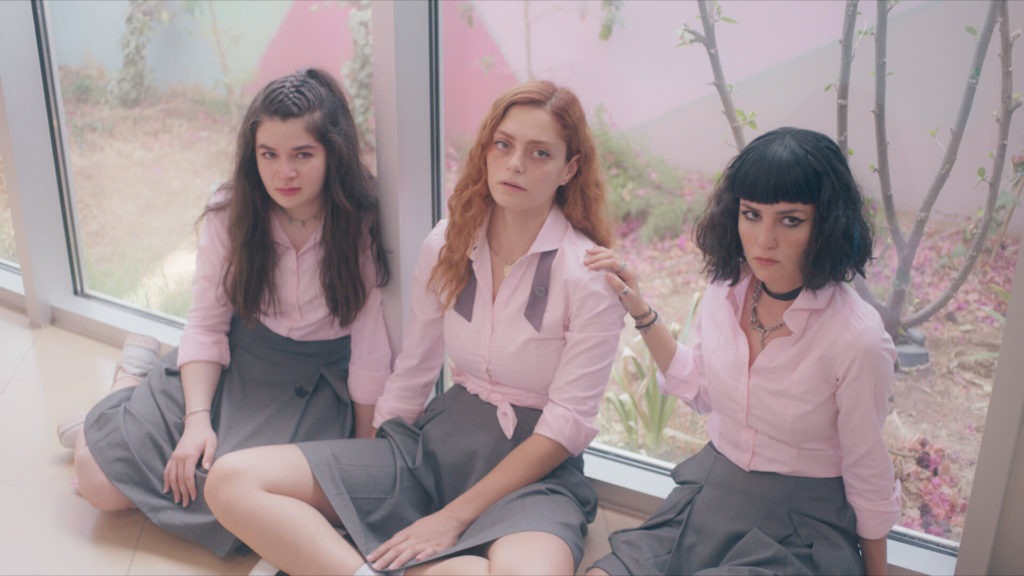It has just been announced that “AlRawabi School for Girls” has been picked up for a second season. The Jordanian Netflix teen drama, though at first, I was hesitant to watch as I recall the trailer giving me an impression of an overly westernized “Mean Girls” it seemed disjointed from our modern Arab culture and struggles however since the time it dropped on Netflix everyone has talked about it, and it definitely trended. This got me curious about the show, though I was still a bit unsure because of the bad aftertaste left by the previous Jordanian Netflix production “Jinn.”
Even when I started the first episode, I abandoned it after the first five minutes. The show gave me the impression of a hollow Arabic version of the Spanish show “Elite.” And I couldn’t have been more wrong.
Once I gave the first episode a chance, I got more than I bargained for. AlRawabi School for Girls consists of a well structured storyline that managed to remain quite entertaining until the very last minute, trapping you in a carefully knitted web of continuous shocking discoveries.
Besides the entertaining factor, the show provides a very relevant and on-point social commentary on the Jordanian and Arab community, especially the Gen Zs community. In addition to the issue of bullying that’s relevant on a global level, it tackles many issues faced by girls and young women, specifically in this part of the world.
The roller coaster of AlRawabi School for Girls
AlRawabi School for Girls is a roller coaster that’ll take away your breath and maintain a rush throughout the series of events that escalate very quickly and unexpectedly. Not only is the roller coaster embedded in the storyline, but it extends as well to the very structure of the character development throughout the show, shifting and revealing more and more with every bit, with the next escalation being even crazier than the one before.
Most shows that depend entirely on the roller coaster to grab the audience’s attention fail to provide a well written dialogue. The story and the dialogue in this show are perfect fits to the puzzle with the character dynamics and shifting perspectives of right and wrong. This is all exemplified in the last episode and the build-up to the dark twist at the end of the show.
The metamorphosis of the victim and villain dualism
The character development in the series continuously peels away, skinning its characters down to the bone, exposing every aspect of their personalities whilst reacting to different situations and under different kinds of pressure.
With zero consideration to the good and evil dualism, we get to see each character as the victim and later on as the villain in another roller coaster of character transitions. Each character has what we might call “the resting state,” where it functions in their most comfortable mood. On the other side there is “the alternative state,” where we see them in a different atmosphere that pushes them out of their comfort zone, turning on some of their inoperative instincts provoked by the nature of their social system interactions.
The metamorphosis of the characters evolve around the shifts from their resting states to their alternative states. Theses shifts explain the rise of the new villains towards the end.
The characters are simply people doing good deeds, and at other times, bad ones. This dualism in every character is quite insightful, realistic, and deals with them as living human beings who are not good or evil, but rather just people who react differently under different circumstances.
When some characters operate in an evil manner, the show quickly reminds you they were victims a few episodes ago, throwing you into a swirl of their past pain and passions. A dizzy swirl of actions and reactions.
The best way to ask deep questions is by camouflaging it with light comedy
In one scene, the teacher scolds Rania, one of the high school girls, for wearing revealing clothes.
She says:
“Revealing that much skin makes you look cheap.”
“How much can I reveal before being cheap?” asks Rania in a sarcastic tone.
This is a very important question society should take a moment for before answering.
A different perspective on women’s issues
In today’s world, women of all age groups are claiming their rights, and the show offers an alternative projection of women’s internal issues.
Although the girls fight ruthlessly throughout the show, it offers a more insightful analysis in regards to their interactions. Instead of manifesting the fights and simply giving the audience an entertaining story, it dives deeper and offers new salvation.
Ultimately though, I recommend watching AlRawabi School for Girls, and think deeply about every little detail in it, no matter how insignificant it may seem at the moment, because it’s worth it.



